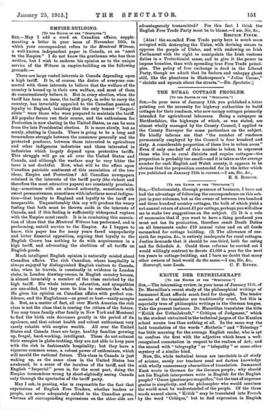EMPIRE-BUILDING.
TO THE EDITOR OF Taa " SPECTAT08:] SIR,—May I add a word on Canadian affairs, supple. menting a letter in your issue of November 16th, in which your correspondent refers to the Montreal Witness, a well-known independent paper in Canada, as an " asset to the Empire." I do not know the gentleman who has thus written, but I wish to endorse his opinion as to the unique service of the Witness in empire-building on the following grounds :- There are large vested interests in Canada depending upon a high tariff. It is, of course, the desire of everyone con- nected with those interests to believe that the welfare of the country is bound up in their own welfare, and most of them do conscientiously believe it. But in every election, when the tariff has been an issue, the tariff party, in order to carry the country, has invariably appealed to the Canadian passion of loyalty to England, insisting that the only honest "Imperi- alists " were those who were prepared to maintain the tariff. All popular fevers run their course, and the enthusiasm for Protection is now abating in the United States, as can be seen from the late Presidential election. It is more slowly, but as surely, abating in Canada. There is going to be a long and tremendous struggle between the consumer generally and the protected producer, between those interested in agriculture and other indigenous industries and those interested in industries which largely depend upon protective tariffs. This struggle will go on all over the United States and Canada, and although the warfare may be very bitter the issue is not doubtful. Now, what will be the effect upon Canadian patriotic sentiment of this association of the two ideas, Empire and Protection P All Canadian newspapers retained in the interests of the tariff party (the richest and therefore the moat attractive papers) are constantly proclaim- ing—sometimes with an absurd solemnity, sometimes with sweet persuasiveness, sometimes with infectious moral indigna- tion—that loyalty to England and loyalty to the tariff are inseparable. Unquestionably this cry will produce the weary feeling that both must be thrown aside in the interests of Canada, and if this feeling is sufficiently widespread rupture with the Empire must result. It is in combating this associa- tion of ideas that the Montreal Witness has performed, and is performing, untold service to the Empire. As I happen to know, this paper has for many years faced unpopularity and bitter financial opposition, arguing that loyalty to the English Crown has nothing to do with acquiescence in a high tariff, and advocating the abolition of all tariffs on English goods.
Much intelligent English opinion is naturally misled about Canadian affairs. The rich Canadian, whose hospitality is always enjoyed by distinguished English visitors to Canada, who, when he travels, is constantly in evidence in London clubs, in London drawing-rooms, in English country houses, is almost invariably a member of the class enriched by the high tariff. His whole interest, education, and sympathies are one-sided, but they seem to him to embrace the whole. He gives his opinion on Canadian affairs with perfect con- fidence, and the Englishman—as guest or host—easily accepts it. But, as a matter of fact, all over North America the rich class is not the class that is rearing the citizen of the future. You may trace family after family in New York and Montreal to find the birth rate decreases greatly in the period of its opulence, and that robust health and robust enthusiasm very rarely cohabit with surplus wealth. All over the United States and Canada there are large, healthy families growing up, frugal, hard-working, intelligent. These do not exhaust their energies in globe-trotting, they are not able to keep pace with the rich in fashionable hospitality; but they have a vigorous common sense, a robust power of enthusiasm, which will mould the national future. This class in Canada is just waking up, as the same class in the United States has awakened, to a sense of the incubus of the tariff, and the English "Imperial" press is, for the most part, doing the Empire tremendous wrong by short-sightedly seeing Canada only through the spectacles of the tariff party.
May I ask, in passing, who is responsible for the fact that expressions of English Free Traders, whether leaders or people, are never adequately cabled to the Canadian press, whereas all corresponding expressions on the other side are
advantageously transmitted ? For this fact I think the English Free Trade Party must be to blame.—I am, Sir, &c.,
RESPICE FINEST.
[Alas ! the so-called Free Trade party here is much more occupied with destroying the Union, with devising means to oppress the people of Ulster, and with endowing an Irish Parliament with the right to manipulate the Irish customs duties in a Protectionist sense, and to give it the power to impose bounties, than with spreading true Free Trade princi- ples. The policy of free exchange is dead in the Liberal Party, though we admit that its forlorn and unhappy ghost still, like the phantoms in Shakespeare's " Julius Caesar," "shrieks and squeals about the streets."—En. Spectator.]


























































 Previous page
Previous page